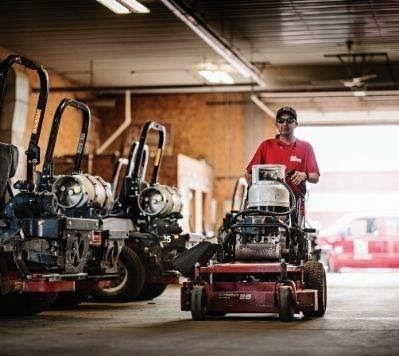Mower Winterization & Maintenance for Landscape Pros
For landscaping contractors, the fall is typically time to celebrate another successful mowing season. As grass growth begins to slow down, it’s also time to start thinking about winterizing your equipment.
Proper maintenance is key to ensuring your mowing equipment performs to its fullest potential. It also extends its operational life which can help reduce overhead expenses. In addition to that, equipment that is properly maintained and winterized will require less maintenance during next year’s mowing season, further reducing operating costs. The winterization process can eliminate many headaches in the spring. It can also save you time when everything needs to be ready to roll at the start of a busy mowing season.
One of the first steps of the winterization process should be cleaning your mowers and equipment thoroughly. It will be beneficial to remove all the dirt and debris from the engine, cutting decks and around the blades. If you wash your mowers, make sure to dry them well before storing to prevent any rusting.
Landscape contractors should also change the oil and replace the oil and air filters in all their mowers. Machines with a hydraulic drive system will need to have the hydraulic oil and filters changed, as well.
Gas left in a mower tank will go bad after sitting for a few months. This can damage engine components and leave your mower inoperable in the spring. To winterize a gasoline engine properly, a stabilizing agent must be added to the fuel and run through the system or the fuel should be siphoned and removed.
Unlike gas engines, propane engines are much easier to prepare for winter. Since propane does not “go bad,” contractors can simply shut off the propane mower tanks and run machines until the hoses are completely empty. The propane left in the cylinder can be kept and used worry-free in the coming spring.
One of the key benefits of propane is that it doesn’t degrade over time like other fuels. Propane mowers also have fewer carbon deposits during operation, extending the time between fuel changes and filters. Like any fuel container, propane cylinders not attached to equipment should be stored securely in a protected area away from any possible ignition sources.
And last, to have your mowers ready to make the cut in the spring, landscape contractors should remove and sharpen mower blades and check them for any visual damage. Lubricating idler arms, pivot points and cutter housings will also help the performance of your mowers come spring. Mowers typically vibrate some during operation, so doing a walk-a-round tightening nuts and bolts will also help ensure smooth operation next season.
Mowers and equipment not properly winterized can shorten the operational life of the units and increase overhead and expenses. Take some time at the end of the mowing season to ensure your equipment is properly maintained. You’ll be glad you did in the spring.
To learn more about propane mowers and their benefits, visit the Propane Lawn Mowers page.
